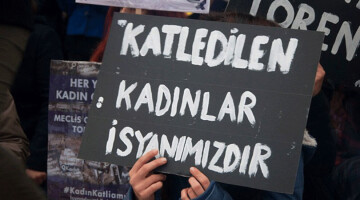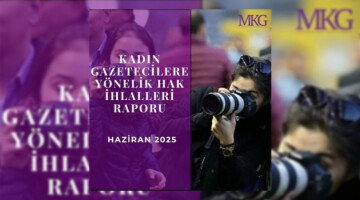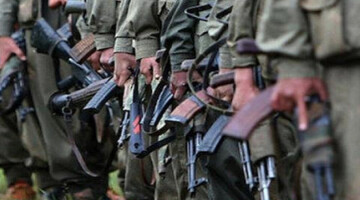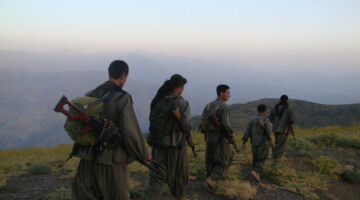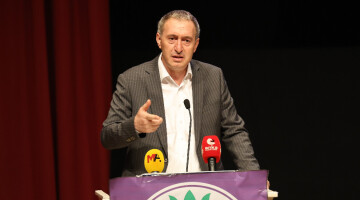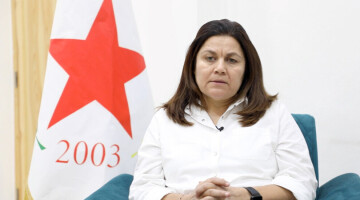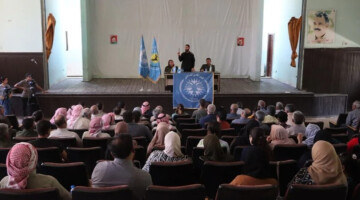YPJ Internationalist Raperin Qerecox explained how she heard about the Rojava Revolution. “I am from Switzerland, and one year ago I came to Rojava. The first time I heard about Rojava was in 2016. I saw how the Turkish state was attacking the Kurdish territories in North Kurdistan. I was really impressed by the resistance that was carried out there, so I started to research the Kurdish resistance. Really soon I found out about the Rojava Revolution. Of course, after the Kobane war there was a lot of support from the leftist movement in Switzerland and from other European countries, and so I started to read and research, and I was really impressed, especially by the Women’s Protection Units, the YPJ, and so I kept myself informed. And then, one year ago, I made the decision to come to Rojava.”
Raperin Qerecox said she was inspired by the women’s movement in Kurdistan. “As leftists in Europe, we were searching for answers to the crisis that the nation-states are living through… I was involved in feminist organizations and we had a lot of criticisms to do about the patriarchal system, but I never found an answer. When I heard about the Kurdish movement, the struggle in Rojava, and its revolutionary project, for the first time in my life, I really saw a concrete answer and a concrete way out of this crisis. Here there is a really direct democracy where society is organized in councils and in communes.
Women’s liberation is at the center of everything. What really impressed me is how, in the Rojava Revolution, women were really at the forefront. And I’m not talking just about the military forces, I’m talking about all spheres of life. So, after I went to Rojava, I really saw that women are everywhere. They are organized in political parties, in the justice system, they have their own academies and are present in the self-defense forces.”
The YPJ internationalist added: “When I first came to Rojava I was really amazed by how much progress had been made. I was not expecting society to be so organized. I went to some communes, I saw how some councils were organized, I went to demonstrations, and that was, for me, really amazing. What was most important for me was to see that the Rojava Revolution is really a people’s revolution. So, for example, when you go to a demonstration you see children, mothers. The whole society is there. They have a goal, they believe in it and organize to achieve it.”
Qerecox spoke about the attacks on the Revolution. “In the last year there were many attacks by the Turkish state on the people of Rojava and there were several drone attacks. Many fell as martyrs. What the Turkish state wants to achieve with those attacks is to spread fear among the people. It’s a kind of psychological warfare. The message is, whoever is bound to this revolution is becoming a target for those drones. Whenever there is a drone strike, there are really massive events to bury the martyrs and people are really committed to their principles, and they know why it’s worth to standing by the revolution. So I can say that the Turkish state cannot achieve what they want with this psychological warfare, because society is so well organized that they will never allow Turkey to break their will.”.
Qerecox explained the framework in which the people of Rojava have organized themselves. “When I think about how life here is different from life back in Europe, I can say that the organization of the revolution is really a common project. The different cities and villages are organized in councils and communes. There is a really collective approach to solving problems. Let’s say there is a problem in a village, so the council of the village is coming together and they are discussing it. What I found really impressive is that the people are really willing to find their own solutions. There is no need to delegate your own problems to an entity like a state. I found this really impressing. People have the strength to solve their own problems. And for me, it became proof that the nation-state is not necessary. That direct democracy can really solve our daily needs and our problems.
So being in YPJ is first and foremost not just taking weapons. Everyone can take a weapon in her hand, but what is really important is the ideology behind it. In the YPJ, we are doing military training, but we also have ideological training. In this ideological training we are talking about the history of patriarchy, what does it mean to be a woman, but we also talk about the attacks the capitalist system is carrying out on women’s identity, and how we can build a truly free woman’s personality. I think in the Western world the YPJ is always seen as women with weapons in their hands and of course we are committed to defending this revolution. But the YPJ was, and is, a force of developing the women’s revolution. So, the YPJ is aiming to build a place in which women can live without all those 5000 years of oppression that were carried out on them.”
The internationalist continued: “I think every woman in the world who is searching for freedom needs to ask herself what the nation-state system is offering to her. And I think as women, when we think about our life and what we want to achieve and how we can really find our strength, we need to organize. I think Rojava is a beautiful place where we can learn how to organize the strength that we have as women. The capitalist system has attacked women’s identity in such a strong way that we see ourselves really small, that we don’t find solutions, that we think it’s our fault. But after I came to Rojava, I saw that when women really organize together, they can create something big. And therefore, I will call on all women to really organize, to really believe in themselves, to find the strength that we have. And therefore, I think Rojava and the women’s revolution here can be a really great example.”
Qerecox made a call to those living outside of Rojava. “To those people who cannot come here, I say inform yourself, educate yourself, don’t believe the capitalist and patriarchal lies. Always think about history. In history there were so many brave women who showed us the way, how we can live, how to fight for freedom. And for people who may have the possibility to come here, I say come. Come here and join the Rojava Revolution, there are so many different places you can work. You can support the Revolution and learn. For internationalists coming to Rojava it’s really about finding yourself, learning about your own history, and finding your strength. So, I think the Rojava Revolution can be a great inspiration for women’s struggle in the whole world, and therefore, I call on all people to support the Rojava Revolution, to come here and to learn from it.”.

